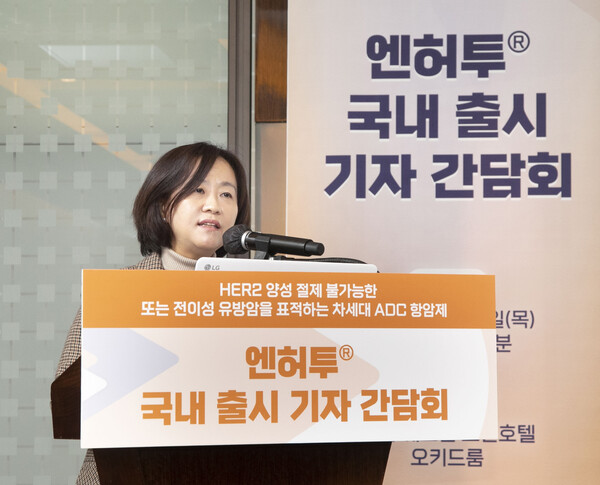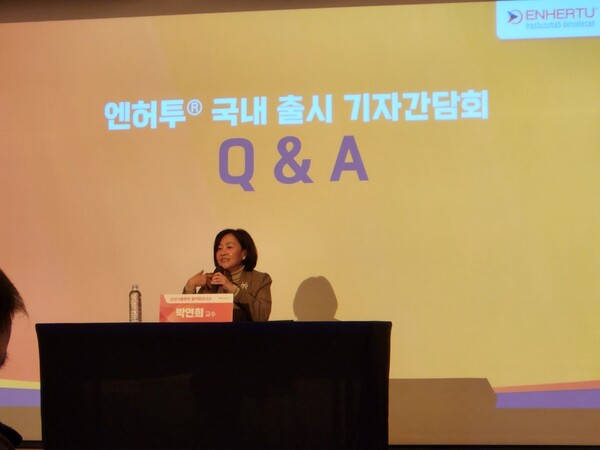Daiichi Sankyo Korea and AstraZeneca Korea held a press conference on Thursday to celebrate last week's launch of its antibody-drug conjugate (ADC) Enhertu (ingredient: trastuzumab deruxtecan) in Korea.

Enhertu is an ADC consisting of the humanized monoclonal antibody trastuzumab covalently linked to the topoisomerase I inhibitor deruxtecan which is approved in Korea, Japan, Europe and the U.S. for varying cancer indications that has a certain mutation in the HER2 gene.
In September, Enhertu won the permit from the Ministry of Food and Drug Safety (MFDS) for the treatment of unresectable or metastatic HER2-positive breast cancer in patients that previously received two or more anti-HER2-based therapies. It was also approved for locally advanced or metastatic HER2-positive gastric or gastroesophageal junction adenocarcinoma that had previously received two or more therapies, including anti-HER2 therapy.
In December, the indication was expanded for the treatment of patients with unresectable or metastatic HER2-positive breast cancer who had previously received one or more anti-HER2-based therapies.
Domestic approval was made based on three clinical studies, DESTINY-Breast01, 03 and DESTINY-Gastric01 studies.
Professor Park Yeon-hee of the Hematology and Oncology department at Samsung Medical Center presented the clinical evidence supporting the approval.
"In the interim analysis of the DESTINY-Breast03 study, which directly compared the effects of Enhertu and T-DM1, Enhertu’s median progression-free survival period (mPFS) was found to be four times longer than that of the comparative group," Professor Park Yeon-hee said, "Enhertu presented the possibility of a new standard treatment in secondary or higher metastatic HER2 positive breast cancer that lacks treatment options.”
She went on to say that increasing the accessibility of patients through health insurance is the next step that she hopes can be achieved in the near future.
While she acknowledged that Enhertu has more adverse reactions than Roche’s T-DM1 (Kadcyla), she said that the benefits outweighed these risks. “It depends on the way in which toxicity is managed and therefore needs to be administered by a qualified physician,” she explained.

She also noted that based on the strength of the DESTINY-Breast03 trial data, the ESMO clinical practice guidelines and the NCCN guidelines for breast cancer were updated, recommending Enhertu as a secondary treatment option.
Meanwhile, Daiichi Sankyo Korea CEO of Kim Dae-jung, said, "We are pleased to provide new treatment options for metastatic breast cancer, which has high unmet medical needs in Korea."
"Based on our expertise in the anticancer field, we will devote ourselves to providing better treatment options to domestic patients through active cooperation with Daiichi Sankyo Korea," said AstraZeneca Korea CEO Kim Sang-pyo.
Related articles
- 12 ADC drugs won nods in 2 decades amid estimated growth rate of 22%
- Is Celltrion dreaming of developing a ‘second Enhertu’?
- Domestic approval of Enhertu opens new ways to treat breast and stomach cancer
- ‘If I could use Enhertu, I would sell my house,’ says a breast cancer patient
- Enhertu launched as gastric cancer tertiary treatment in Korea, insurance benefits loading
- AZ leads breast cancer treatment market with expanded portfolio

